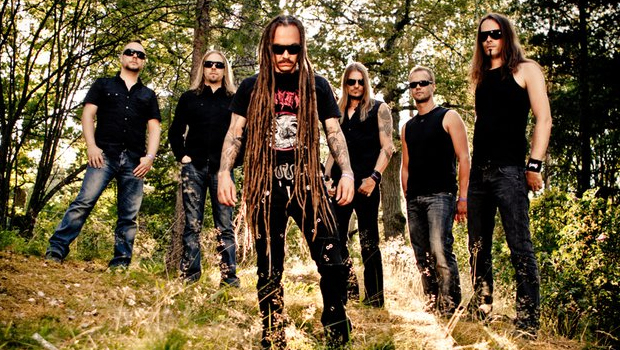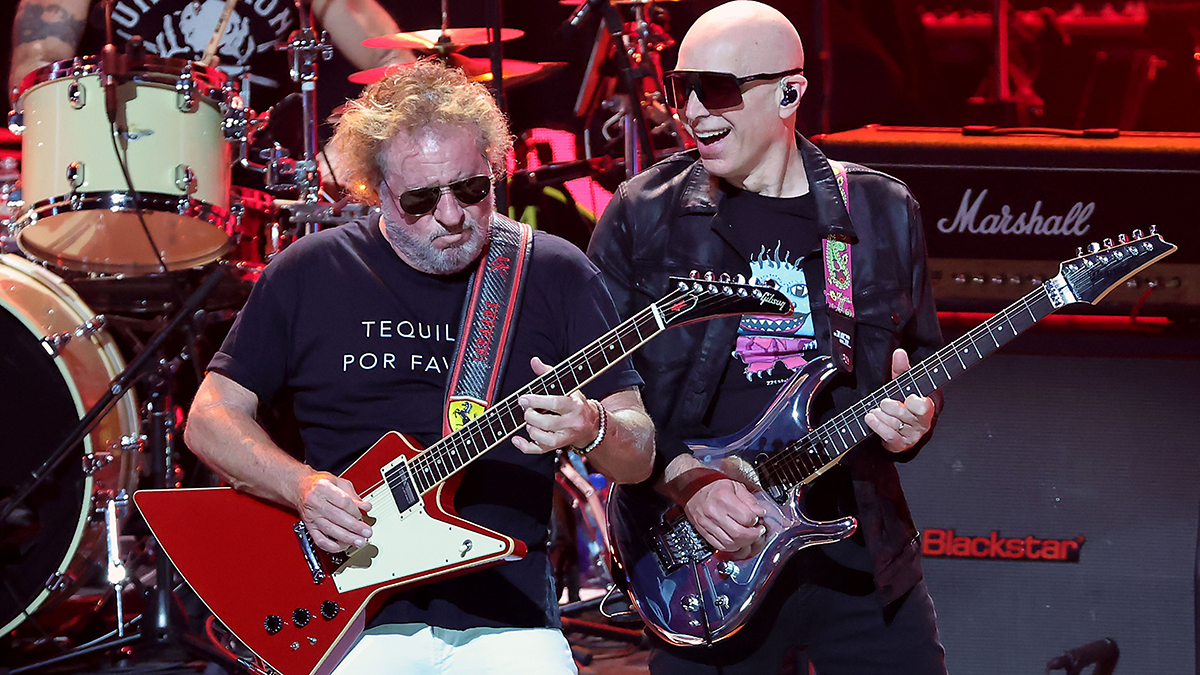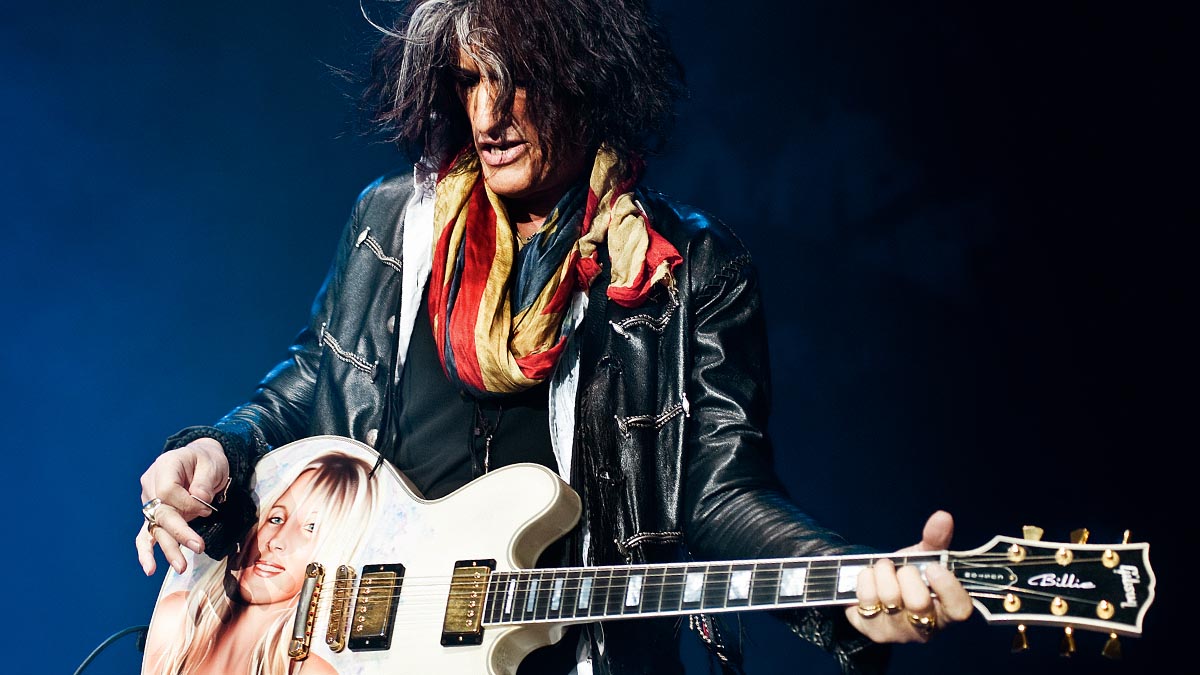
From progressive death metal to folk-inspired melodic rock, Finland's Amorphis have seemingly done it all over the course of their career. Ever since the addition of vocalist Tomi Joutsen in 2005, Amorphis have produced four of the most consistently enjoyable records in the metal world, the first of these, Eclipse, marking somewhat of a rebirth for the band.
The band's tenth and most recent studio album, The Beginning of Times is no exception, as the band once again explore the seemingly endless realm of Finnish folklore to churn out yet another batch of catchy, melancholic hard rock songs.
We recently got the chance to talk to Amrophis guitarists Esa Holopainen and Tomi Koivusaari about The Beginning of Times, their songwriting process and the place of Finnish lore in the band's music.
Talk a little about the theme of the album, and how Travis Smith’s artwork illustrates what we’re hearing on the album?
ESA HOLOPAINEN: The coverart describes the birth of the world. It was believed that the world was created from a duck's egg. Weird? Overall Travis did amazing job with the whole album artwork.
Tomi Koivusaari: The theme is about the beginning of time (surprise!); according to Finnish mythology, the world was born from an egg, simple as that. The story is concentrating to Kalevala's center character Väinämöinen, who is almost half-god. A pagan-one though.
Also there is nice reverse-mermaid on the sleeve, Travis once again did a great job. We gave him some ideas and he took some of his own, that's how it usually works.
Get The Pick Newsletter
All the latest guitar news, interviews, lessons, reviews, deals and more, direct to your inbox!
Discuss your gear set-up for the new album.
E.H.: I used my ESP Custom Eclipse model guitars which are equipped with Seymour Duncan SH-5 (custom) and SH-1n ('59) pickups. I have Bogner Shiva anniversary amps which I use live and in the studio. I use Bogner Ubershall cabs.
Effects-wise, I used HBE Chorus and Phaser and several delay pedals, including a Boss Giga Delay and an Eventide Time Factor. One important effect is my old VOX McCloyd wah which I have been using for several Amorphis albums now.
T.K.: Personally instead of Marshall this time I used Engl's Invader amp for the rhythm guitars, with some Marshall 900 on cleaner parts. I used only analog pedals, such as analog delay, wah, phaser.. very basic stuff. I have few customized ESP's which I used on recordings as well. Also on this album I played some additional pedal steel guitars here and there; I love that sound. On live playing I still prefer a Marshall JVM 410 or 900 head.
This definitely sounds one of the more challenging albums Amorphis has done in terms of song structures, changes in the music and the overall theme. Was this the plan when the songwriting process started or did the album take on a life of its own as the songs took shape?
E.H.: We didn't look back that much what we did on last albums. A new album is always a new challenge and you never know the final result until all is done and mixed. Personally I tried to come out of a more organic sound world. Composing, I usually start with one melody line where I start to add more layers. Everything starts with meldody, that's the core and soul of the song.
T.K: We knew that theme is going to be about Väinämöinen, so that might have affected us to write more “heavier” stuff. Also it always goes with its own life, we start from a blank table. The new album might need more listenings before it opens, compared to Skyforger.
We also had a little more time to concentrate to arrangements. We started to check out songs at our rehearsal place last summer, did some raw demos first, then headed to studio to record all of the instruments. I think there were like 17 songs, and we chose those which fit best the album. After that we continued touring, so we had plenty of time to think about vocal parts and additional stuff. The vocals were finished in February of this year.
Describe the songwriting process for Amorphis. Does the band all play in one room working on songs, or are there one or two songwriters who generate almost all of the ideas?
E.H.: We all write music, so that's one of the reasons why we came out with so many songs within a quite short period of time. We had around 17 tracks from where we picked 12 tracks plus a bonus track for the album.
Usually everyone does their demos at home then presents the songs for the band. We start to rehearse them together and think about arrangements. I use LogicPro at home to do demos.
T.K.: Almost every one of us are writing songs. Those which will end up on an actual album we choose based on which songs make best album as a whole.
We all writing as home, as we all have at least some kind of home studio that we demo songs out of. It is so easy nowadays to send ideas by email. Of course songs will change quite a lot with a band, but at least you can get a clear picture. When there are enough raw song ideas, we gather at our rehearsal space and start working on new ideas and arrangements together. Usually everyone has something to offer for songs.
This also seems like one of the heaviest albums Amorphis has done since Tomi has taken over vocals, why do you think that is?
E.H.: The songs vary a lot, so we presented the more fragile as well the more agressive Amorphis on this album. Some of the songs needed more "brutal" touch, and it might be that the theme of this album was also an influential element.
T.K.: Hard to say, it just came out that way; it wasn't actually on purpose. We did this Magic and Mayhem album with newly re-recorded versions of songs from first three albums, and small tour with all former members after that, so that might have affected its heaviness.
After a 20-year career, it is sometimes fun to look back to your own history and there's nothing wrong with taking influences from there too. But mainly our target is always going forward, and that's the case with this album as well. Also, the heavier the song is, the more fun it is to play it live!
You guys have always embraced the history of your homeland in your music. How important is Finnish history/heritage to the music of the band?
E.H.: We are very much influenced by the themes of the Kalevala, which is an old poetry book telling old mythologies and philosophical ideas of the Finnish people before Christianity took over. We are not patriots, but Finnish nature inspires us a lot.
T.K.: Well Finnish mythology is connected strongly to our music, you cannot deny that. It is part of what our fans think of when they think about us. To us, music comes first, and lyrics are important of course, so it is good if they are in same world with music, which they in my opinion are; they fit perfectly with our songs.
It has just kind of become our own thing, singing about the mythology of our personal roots feels more or own than singing about death, rotting corpses or wars, for example. Also, the cool thing is that Pekka Kainulainen has written lyrics in such a way that they work independently as well, so that you don't have to know anything about Kalevala. Overall, Finnish mythology is more like a source of inspiration to us, but not our main thing.
The new album from Amorphis, The Beginning of Times, is out now on Nuclear Blast Records.
Josh Hart is a former web producer and staff writer for Guitar World and Guitar Aficionado magazines (2010–2012). He has since pursued writing fiction under various pseudonyms while exploring the technical underpinnings of journalism, now serving as a senior software engineer for The Seattle Times.
“Even the thought that Clapton might have seen a few seconds of my video feels surreal. But I’m truly honored”: Eric Clapton names Japanese neo-soul guitarist as one to watch
“You better be ready to prove it’s something you can do”: Giacomo Turra got exposed – but real guitar virtuosos are being wrongly accused of fakery, too










